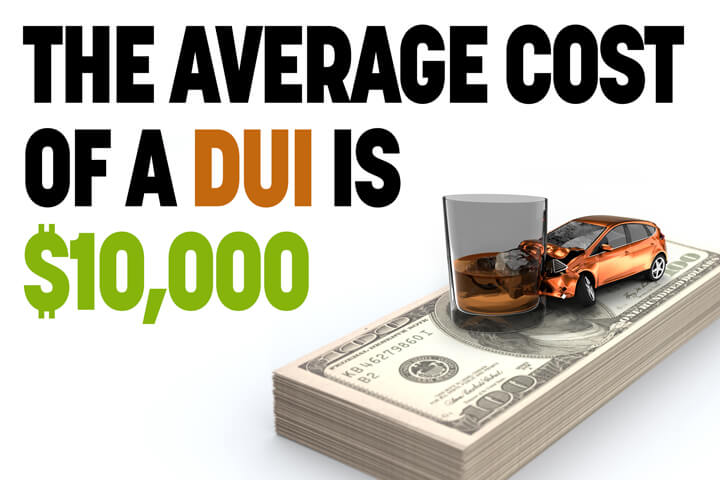Driving Under the Influence (DUI) is not merely an infraction; it represents a multitude of financial ramifications, social repercussions, and emotional tolls. In California, where the sun shines brightly yet the judicial system casts its shadow, the average cost of a DUI can be staggering. Understanding these costs is imperative for anyone who operates a vehicle. A shift in perspective on the cost of a DUI could unlock insights that extend beyond mere monetary expenditure.
To unpack the average cost of a DUI in California, it is essential to consider the myriad components that comprise the total financial burden. Initially, one might think of the direct costs, often beginning with legal fees. A standard DUI charge typically incurs attorney fees ranging from $2,500 to $5,000, with the expense increasing dramatically for more complex cases. The expertise of a seasoned DUI attorney is invaluable, as it drastically affects the outcome of the case and any potential penalties.
Moreover, court fees contribute another layer to this financial quagmire. In California, charges can vary, but individuals may find themselves owing between $500 to $1,500 just for the court processes alone. While the prospect of navigating the legal maze might seem daunting, the hidden costs often surface later. These hidden costs include fines imposed as part of the sentencing, which can set individuals back by upwards of $1,800, depending on the circumstances.
Indubitably, the economic burden does not conclude with legal fees and fines. Glaring expenses emerge from mandatory DUI programs. California mandates that those convicted of DUI participate in a treatment program, which typically ranges from $500 to $3,000. The requirement to complete these programs often entails lost wages, further amplifying the financial strain associated with a DUI conviction. Revelations like these may prompt one to reconsider the risk involved in driving under the influence.
Insurance premiums represent another significant cost that many often overlook. A DUI conviction generally results in a dramatic increase in car insurance rates. On average, individuals can expect to pay an additional $3,000 to $6,000 over several years due to a DUI on their record. This uptick in payments can create long-lasting financial implications, transforming the initial decision to drive while impaired into a painful, ongoing economic crisis.
Beyond the immediate financial costs, there are other forms of collateral damage that may not be as easily quantified. Individuals may experience detrimental effects on employment opportunities. Many employers conduct background checks and may regard a DUI as a red flag, potentially disqualifying candidates from consideration for lucrative positions. The effect of a DUI conviction could very well alter the trajectory of one’s career, causing emotional and financial strain that lingers far beyond the original incident.
Another often unnoticed consideration is the impact on the family unit. The stress and strain inflicted by a DUI charge can take a toll on relationships. Families may succumb to heightened tension and conflict as the recreational driver navigates the complexities of legal troubles. Legal fees, treatment programs, and the fallout from these experiences can create additional strain, coaxing families into financial distress and emotional upheaval.
While financial challenges may appear insurmountable, there exists a tantalizing subtext—DUI repercussions can serve as a moment of transformation for individuals. Ideally, the ordeal can trigger self-reflection, leading to a more profound awareness of one’s actions and their consequences. Individuals may be inspired to change their behavior, opting for public transportation, rideshare applications, or designated driver arrangements in social settings to mitigate potential risks.
Empowering communities to advocate for responsible behavior is an essential step toward combating the pervasive issue of DUIs. Awareness campaigns that emphasize the detrimental financial implications could motivate individuals to assume accountability for their choices. Shifting the narrative surrounding DUIs from mere legal ramifications to a broader discussion about community health and responsibility may shape a safer driving culture in California.
In light of these countless dimensions associated with the average cost of a DUI, individuals must comprehend that the decisions they make extend well beyond themselves. Each choice has a ripple effect; an expensive financial burden transforms into an opportunity for dialogue about safety, responsibility, and community unity. Awareness alone may not eradicate the scourge of DUIs, but it serves as a catalyst for change—an invitation to reexamine our cultural ethos regarding drinking and driving.
Ultimately, to reduce the incidence of DUI-related events, it is vital to advocate for policy changes that emphasize prevention and treatment rather than solely penalization. Programs that aim to educate drivers about the consequences of their decisions are crucial. By fostering a collective understanding of the expansive costs associated with DUI convictions, individuals and communities alike may pave the way for safer roadways and ultimately, a more conscientious society.
In conclusion, the average cost of a DUI in California underscores a multifaceted dilemma permeating both individual lives and broader societal contexts. With a convergence of emotional, social, and financial ramifications, the consequences of driving under the influence extend far beyond a simple infraction. Recognizing these implications, society can embark on a new path, focusing on prevention, education, and a communal commitment to reduce DUIs, thereby enhancing the safety and welfare of all road users.
